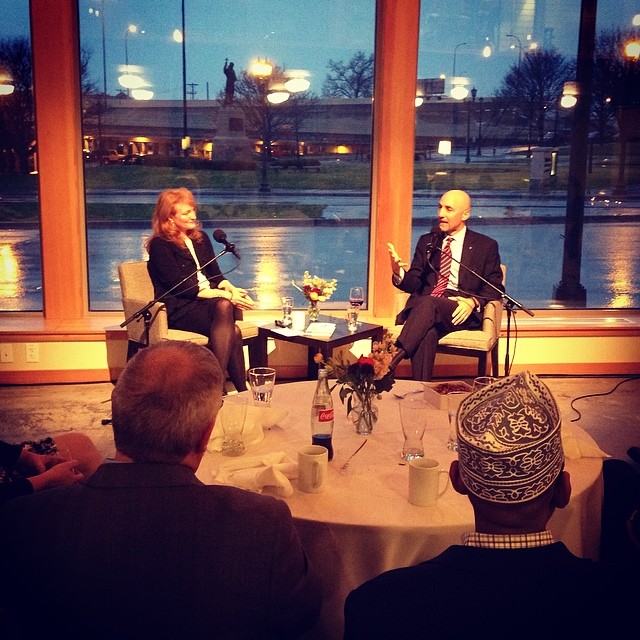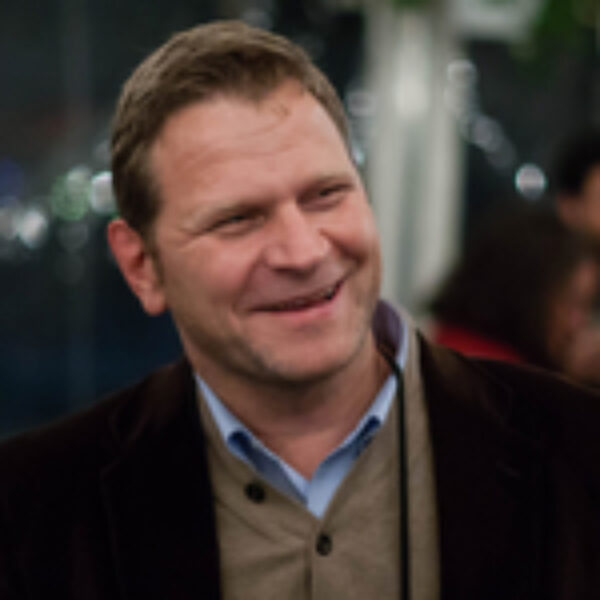
Bill Antholis on Religious Pluralism at Home and Abroad
“The joke that many Indians have about India is that there are too many gods, and the thing that we heard from Chinese is that there is not enough God in China.”
Bill Antholis spent five months with his family traveling and living in India and China. The managing director of the Brookings Institution and author of Inside Out, India and China, he trekked to eleven Indian states and nine Chinese provinces, talking to hundreds of people on the streets, in local governments, and in business communities. One of his findings? Like many of us in the U.S., these two countries struggle with questions about religion, faith in public life, and political tolerance and pluralism:
“We were struck from the time we arrived in India until we finished our travels in China at how those two massive places struggle with these same set of questions, both democracy, how you spread it across a continent, with even more diversity than North and South America and Europe.”
On Being invited Mr. Antholis to speak about his understandings and to share some of his personal experiences while studying and researching the dynamic, unfolding nature of these two major countries. He spoke with our host Krista Tippett on April 23, 2014 at the Humphrey School of Public Affairs at at the University of Minnesota.
During this discussion, he presented four ways states have tried to reconcile religion and religious pluralism, and how states relate to beliefs:
-
- The Leviathan State. “In the Leviathan State, essentially there was an effort to deal with disorder by imposing order, and in doing that they made certain beliefs illegal. The Leviathan State is one that sees religion as, not just a tool of the state, but the essential justification of the state. Any dissent was not allowed.” China is an example of this approach. The strength is order; the downside is hubris, says Mr. Antholis.
- The Paternalistic State. “The state receded from imposing order on everyone, but instead said it was going to promote a single religion, but was going to allow other religions to operate. They operate at a disadvantage because the state is supporting one. It’s just sort of conceited. It has a feeling that it’s got it right and that others are wrong.” Countries that represent this type of state include the United Kingom, Turkey, and to some degree Russia. The downfall of this state is conceit.
- The Watchman State. “Here, essentially, the state doesn’t trust religion. It fears the religious wars that strafed across Europe, and that they will undermine a state and that civil war will break out. So all religions are essentially put at a disadvantage — they’re categorized, they’re catalogued, they are forced to register, and they’re watched.” France is an example of this type of secular state. The upside is that its citizens are allowed to practice, but there’s a certain amount of fear and that it’s difficult to practice or celebrate publicly.
- The Celebrant State. “What Jefferson promoting was, famously, was a wall that separates church and state. But he was not against religion — he was against the state supporting any one, or any religion. Critical in Jefferson’s thinking, and for what I refer to as the celebrant approach to religious diversity — the idea that civic society actually needs the moral underpinnings that religions provide. In his idea, not even the individual, but the human mind was the only truly sacred thing. What Jefferson feared was that the state would take on the trappings of majesty that had always fallen to kings, that were wrapped up in religious mythology and mysticism. And he thought that they would use that as a way of putting a cloak over peoples’ eyes.” The U.S. embodies this approach. A downside is that it makes it difficult for non-believers, but there’s an open acceptance of religious diversity of practices.
Mr. Antholis’ framework led to a vibrant conversation about the role of religion in the development of U.S. democracy — in all its messiness and splendor. Of course, a discussion about American democracy almost always includes references to our third president, Thomas Jefferson:
“Jefferson believed that moral instruction was critical. And I think he would be really proud of the fact that the first elected Muslim member of Congress, your representative [Congressman Keith Ellison], was sworn in on his version of the Qur’an. That would very much speak to Jefferson as the celebrant.”
But, as Mr. Antholis notes, religion has also been wielded as a weapon in the U.S.:
“We have seen religion as a justification for everything from slavery to a different status for racial, ethnic minority groups, for women.
We’ve seen the burning of Qur’ans justified in terms of religious civic engagement. And I think Jefferson was aware of that downside. He wanted to make sure, particularly in the letters that he wrote to Jewish congregations across the United States, that they were protected from a dominant religion.”
An Orthodox Christian, Mr. Antholis says that he appreciated the values of a celebrant state most after traveling in China and India and trying to practice his faith while living there:
“It makes me sort of proud to be an American. I’m almost embarrassed to say it. But we’ve managed — for all of the challenges of religious pluralism in the United States — we’ve managed to strike a balance here that I think is critical to preserve and advance.”
This is about 30 minutes in to the 70-minute conversation. The rest of the conversation carves marvelous, wide-ranging channels — covering everything from the Turkish model of democracy and Prime Minister Erdogan’s changes from the secular democracy established by Kemal Ataturk to a rich Q&A session. Reflecting on the late Dr. Sherwin Nuland’s way of bringing his scientific sensibility to his faith and his non-traditional view of spirit, Mr. Antholis offers this thought:
“It got to an essence of the importance of faith that I think we need to reestablish in America and advocate for, which is this Jeffersonian notion of the sacredness of the mind, and the ability to bring forth energy into public life, and to celebrate that. But to understand that’s always subjective and that what our engagement in public life is intersubjective — that we all have the need to do that for ourselves. And that’s what is sacred.”
